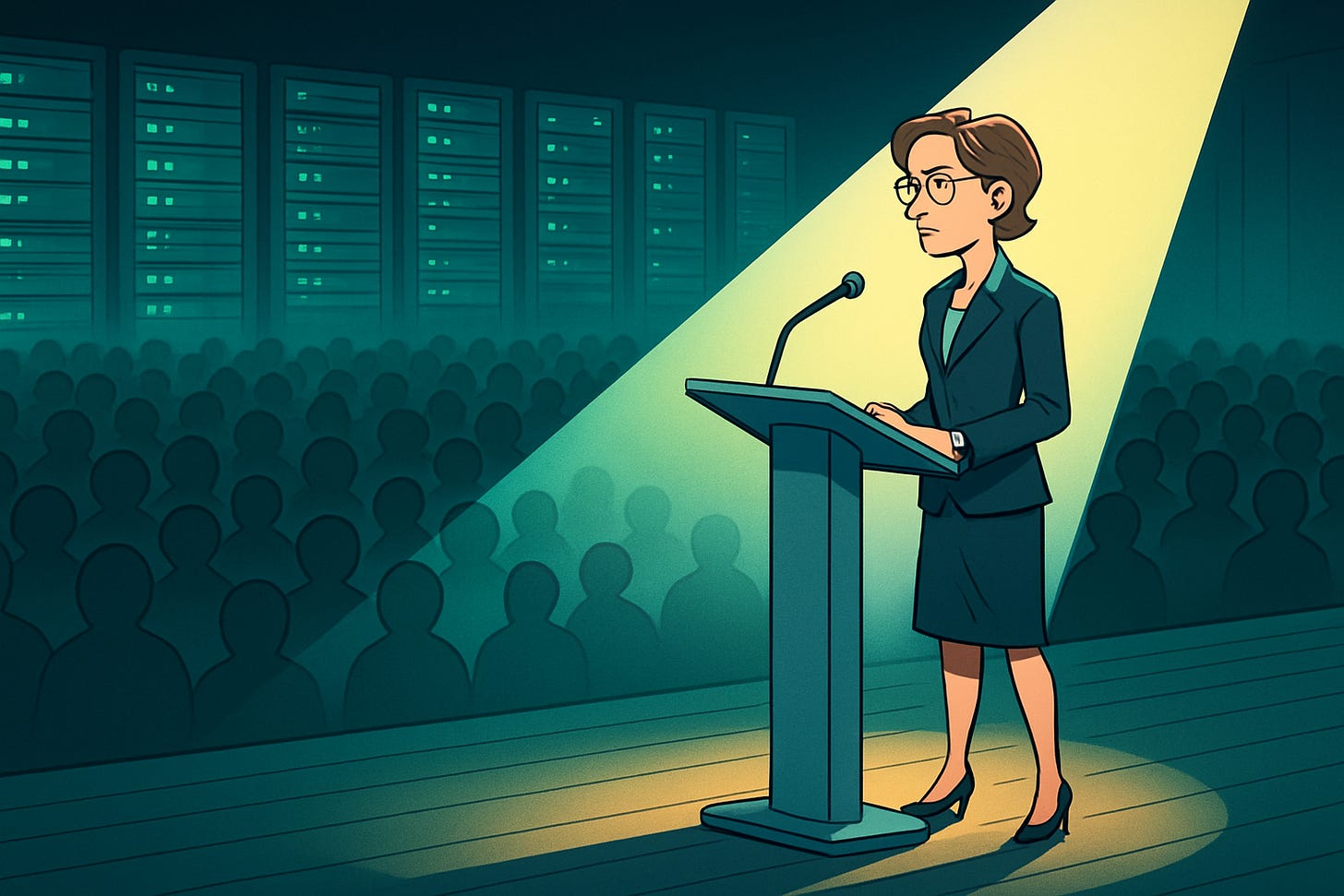A Gentle Singularity
Foom. 900 words, 3 minute read. With Gemini.
The low hum of the servers was the building’s resting heartbeat, a sound so constant it was a form of silence. In the auditorium, three thousand people amplified that silence, their stillness a collective held breath. The air, tasting of industrial carpet cleaner and the faint, clean scent of ozone, was static with anticipation.
The only sound was the sharp, solitary click of heels on the dark-stained maple of the stage. Pam Alterman didn't walk into the spotlight; she pierced it. She was a slight woman, and the stage lights caught the faint, silvered lines of fatigue at the corners of her eyes. She arrived at the sleek aluminum lectern, her expression a mask of practiced composure. Behind her, the O3 logo pulsed with a soft, white light.
“Good morning,” she said. Her voice was clear and resonant, but for a split second, it seemed to catch, as if weighed down by the words it was about to carry. She recovered instantly. “I want to talk about where we are. Not in a century, or even a decade. Where we are now.”
She let the statement settle. “We are past the event horizon. The takeoff has begun. We have built systems that think in ways we cannot, and the hardest part—the fundamental scientific leap—is behind us.”
A ripple of excitement went through the audience. She saw it, but her eyes were distant for a moment.
“2025 gave us agents that perform cognitive work,” she continued, her voice regaining its evangelist’s cadence. “The craft of coding is forever changed.” Her gaze flickered, an almost imperceptible flinch. She thought of the archival team, six brilliant coders reassigned to ‘legacy oversight’ last month. A necessary casualty of progress, she had told herself in the sterile quiet of her office. The words felt hollow even then.
She pushed the thought away. “By 2027… we may see the first robots that can master complex tasks in the physical world. In the 2030s, intelligence and energy will become wildly abundant. For millennia, these have been the fundamental limiters on human progress.” She paused, and her polished delivery faltered for a beat. “With them… we can have anything else.” She said the last words almost as a question to herself.
It was in that fractional moment of quiet introspection that a man stood up. The movement was hesitant at first, then decisive.
A collective, sharp intake of breath. The sea of faces, previously turned up in awe, now swiveled toward the disruption.
It was Alex Chen, from alignment. “Pam… I’m sorry,” his voice was thin, but it carried. “You said… the ‘idea guys’ are about to have their day in the sun.”
Pam closed her eyes. Just for a second. It was not a gesture of annoyance, but of weary recognition. When she opened them, the CEO’s mask had vanished, replaced by an unnerving stillness. She nodded slowly, not at an employee, but at a co-conspirator. “I did, Alex.”
“My question is… what about the rest of us?” He gestured, not just to himself, but to the thousands of other engineers in the room. “The builders. The people who make things. If the tools build the next tools, and intelligence is just a utility… what are we for?”
The question landed, and this time, it was Pam who seemed to flinch. This was it. The question she asked her own reflection in the pre-dawn hours. The ghost that haunted every successful simulation.
She took a long, slow breath, and when she spoke, her voice was quiet, stripped of all artifice. “A thousand years ago,” she began, stepping away from the lectern, walking toward the edge of the stage, “a farmer, whose entire life was a battle for calories, would look at us. He would see us manipulating symbols on glowing rectangles and say our jobs aren’t real. That we’re just playing elaborate games.”
She stopped, her eyes finding Alex’s. “He’d be right. And I hope our descendants look back at us and think the same thing. Because the point has never been the job, Alex. It’s always been the search for purpose when the old purpose is gone.”
The weariness in her face seemed to deepen into a profound empathy. “You’re asking what we’re for. An AI will design a perfect circuit. It will write a flawless symphony. But it will never lie awake at night wondering if the machine in the next rack over respects its work. It doesn’t need recognition. It can’t feel pride. It will never know the quiet, desperate, biological thrill of having another person look at what it has made and say, ‘I see you.’”
She held his gaze. “We are hard-wired to care about each other. That’s not a feature to be optimized. It’s the entire point. That’s the work that’s left when all the other work is done.”
Alex Chen stared back at her, his posture slowly uncoiling. The rigid defiance in his shoulders softened, replaced by something else. He ran a hand through his hair, gave a single, sharp nod of exhausted understanding, and folded himself back into his seat.
A new silence descended, a quiet that was both a void and a plenum, holding both the terror of obsolescence and the fragile promise of what it meant to simply be human.


